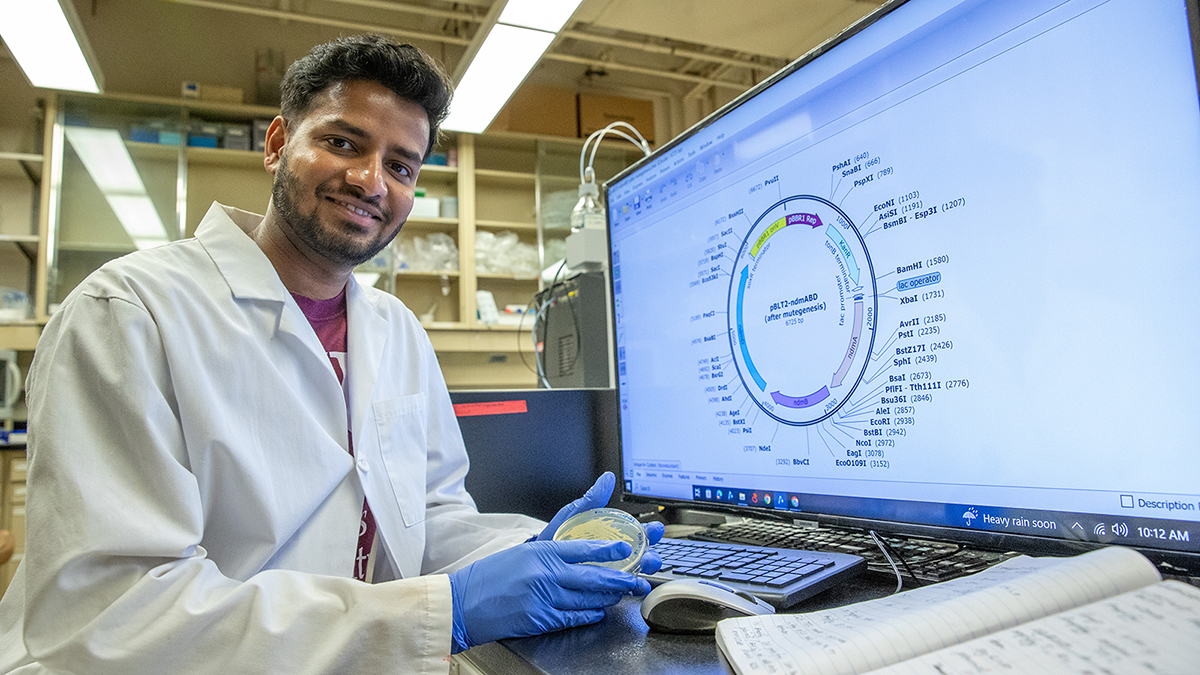
Bhagya Jayantha, a doctoral student in molecular biology, microbiology and biochemistry, is working on a process for upcycling food waste into biodegradable food packaging material. (Photo by Russell Bailey)
May 07, 2025
SIU researcher seeks to upcycle food waste into biodegradable packaging
CARBONDALE, Ill. – It might surprise you to learn that the No. 1 type of landfill waste in the United State is food. That being the case, a researcher at Southern Illinois University Carbondale is looking for ways to divert that waste into a process for making biodegradable packaging for food.
Bhagya Jayantha, a doctoral student in molecular biology, microbiology and biochemistry, is working on a process for upcycling food waste into biodegradable food packaging material. He is working with Lahiru Jayakody, associate professor of microbiology, on the project.
“Simply discarding matter that can be transformed into useful products is counterproductive to prudent fiscal and sustainable practices,” Jayantha said.
Food makes up 22% of municipal solid waste. Worldwide, wasted food accounts for 11% of the world’s carbon emissions, making it the third-largest human-made source of methane. According to the U.S. EPA, diverting food waste from landfills could reduce methane generation by some 33%.
While food waste is choking landfills, nearly 60% of plastics produced go to food packaging. Using food waste to create biodegradable packaging would therefore have the added benefit of decreasing the amount of plastic that ends up in landfills.
An additional complicating factor involves the active compounds that leach out of food waste and into the environment. For example, some 50 million tons of caffeine-containing waste is discarded into landfills each year.
But food waste also contains diverse compounds that make it potentially ideal for upcycling into value-added products, Jayantha said.
Tapping a Saluki technology
The heart of Jayantha’s process is oxidative hydrothermal dissolution (OHD) technology. The environmentally friendly technology, developed by Ken Anderson, professor and director of the Advanced Energy Institute at SIU, uses heat, pressure, oxygen and water to convert low-value solid materials, such as food waste, into water soluble substances that in turn can be used to create new materials.
“OHD can take a range of complex organic matter, including hardwood, and depolymerize it into simple compounds that can be utilized by engineered bacteria to produce high-value chemicals,” Jayantha said. “Food waste components, like cellulose, lignin and sugars, can be processed by engineered bacteria to produce platform chemicals in biodegradable polymer generation, which can replace petrochemical derived polyethylene, PET and polystyrene.”
‘Bugs’ are key
While the OHD process has been around for some time and is well understood, finding the correct type of bacteria that produce the valuable precursors by dining on the slurry will be one of the challenges. Jayantha hopes to upcycle biomass with woody cell walls and waste PET to polymers that can be used in biodegradable packaging materials by metabolically changing the bacteria.
“Bacteria are like tiny, programmed machines, except they are alive,” he said. “We hope to change their DNA, deleting genes, adding new genes, overexpressing existing genes and suppressing genes to make them produce something new or better, such as eating pollutants to clean the environment, producing important chemicals like medicine or fuel, etc. These genetic modifications are called rewiring.”
Next steps
While work in the lab is underway, plans call for Jayantha eventually to begin real-world experiments, collecting food waste from houses and local businesses. For instance, he recently collected used coffee grounds from a local business and successfully extracted caffeine.
“We used the extracted caffeine with one of my engineered bacterial strains to demonstrate its suitability to produce a high-value chemical used in medical applications,” he said. “We can envision a process that reduces municipal solid waste while creating a circular economy that requires 65% less energy creating biodegradable food packaging than conventional plastics require, minimizing greenhouse gases and reliance on petroleum-derived chemicals.”
Jayantha’s research is supported by a $290,000 grant from Green Core Ltd and Ito En USA. He also receives support from the Environmental Research and Education Foundation doctoral fellowship. His work is one example of many projects that make SIU Carbondale a Research 1 university in the Carnegie Classification for Institutions of Higher Education.
